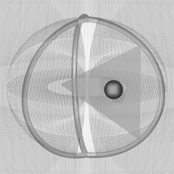



































conceptual inquiry regarding meaning » intelligibility » objectivity
Objective experience occurs as we stand away from what we're experiencing, impartially observing it. This distance is what allows us to form beliefs and make accurate claims about what we're experiencing.
The field of objectivity establishes a relation between experiencer as world and experienced as dynamic by the activity of experiencing as self—that is, by experiencing in accordance with a mode of attending that focuses on particular features of experience. Graphically, this field of relation is depicted as a cone opening up to the right. The apex of the cone represents the mode of experiencing/attending, while experiencer and experienced occur at two points along the circumference of the cone's base as separated by the base's diameter. Click A-phase correlation under the image to see the elements of objectivity, the colors of which correspond with the items in this table:
| P | objectivity: focused attending to factual experience, toward propositional knowledge |
| experiencer as world = an universal point of view, the nature of which is common to all participants in a world | |
| experiencing as self = attending to particulars; attending in a focused mode, narrowing the scope of attention | |
| experienced as dynamic = durational facts, events, and states of affairs |
When we speak of truth, we usually mean truth as arrived at via objectivity. When we speak of knowledge, we usually mean the type arrived at within the field of objectivity—namely, propositional knowledge. Objectivity is, therefore, the most thoroughly explored field of intelligibility there is.
Since self is to part as world is to whole, experiencing as self—or, experiencing self-ly—means attending to parts, or focused attention. This focused attention analyzes our continuous flow of experience into manageable, useful chunks, categorizing and labeling aspects of experience. With reference to this Project's diagrams, the cone of objectivity involves a paradoxical tendency. Taking the cone to be symbolically refering to a cone of vision, the attending activity (the cone's apex) tends to narrow the angle of the cone's focus. Yet to accomplish this narrowing, experiencer and experienced (at opposite ends of the diameter of the cone's base) must tend to move further apart. There's a simultaneous narrowing of scope in experiencing and widening of distance between experiencer and experienced. The gap between experiencer and experienced opens a space in which assertions can be made, and the narrowing cone of focus picks out specific features within that space to make assertions about.
It must be remembered that assertions aren't experienced; assertions are made about that which is experienced. When we believe we know the truth of some claim, we can draw a distinction between the object of our knowledge and what our knowledge is about. Our knowledge is about a fact or event or state of affairs, and the object of our knowledge is the meaning of a claim about the fact, event, or state of affairs when the meaning agrees with the truth of the matter. Facts, events, and states of affairs are, in this case, tied to reality, while truth in this case is a possible property of claims. In short, what we can know objectively (propositionally) is the truth of claims about reality, not reality itself. Reality can't be contained in our propositions. It's important to keep this in mind, as claims are usually thought of as capturing snapshots of reality—freezing an otherwise dynamic domain in a frame fixed in time. But, again, we don't experience claims, not even objectively. Features of reality are experienced—facts, events, states of affairs—and these are always dynamic in nature, occurring durationally over some span of time, even if the span of time is the lifespan of the universe (when, presumably, it comes to claims like F=MA, for example).
